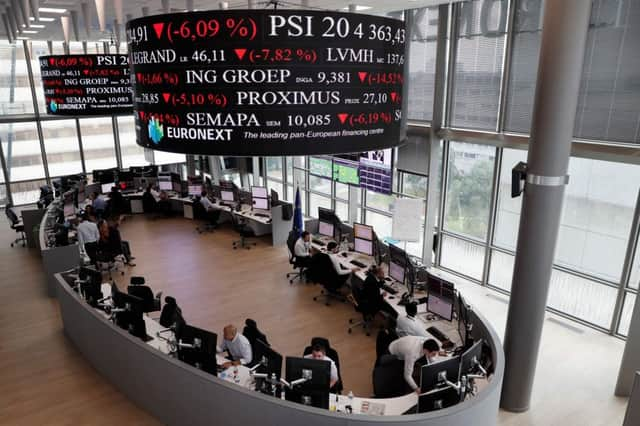Bill Jamieson: Whatever next for experts caught on the hop?


Seldom has “received wisdom” suffered such a brutal unmasking than in the early hours of Friday morning when the first EU referendum results came through.
The mayhem in markets was immediate. The pound fell to its lowest level for 31 years. And the FTSE100 Index fell by as much as 8.7 per cent.
Advertisement
Hide AdAdvertisement
Hide AdBut a reassuring statement from Bank of England Governor Mark Carney helped to pare the pound’s losses. And opportunistic bargain-hunting saw the FTSE100 Index loss cut to 3.2 per cent by the close. In fact, it ended the week still showing a two per cent gain.
Nevertheless, this was a massive event for investors. Whatever happened to so-called “market intelligence”? The bold, know-it-all swagger of hedge funds? The efficient market hypothesis?
Not for the first time, professional investors fell victim to what ‘black swan’ market guru Nassim Taleb called a “narrative fallacy”: only believing a story that they favoured and noting only the facts that fitted that narrative – an all-too-common human fallacy. As if public confidence in expert forecasts was not already low, how much lower has it tumbled after an outcome they didn’t foresee?
These are big enough questions for investors. But by far the biggest is where the market goes from here.
Comforting though it was to see those initial losses being cut back and that the worst immediate forebodings over a Leave vote have not been realised, it is far from assured that last Friday afternoon’s rally will be continued.
It’s not just that we have entered a period of huge uncertainty for business and investors. We don’t know when the Article 50 button will be pressed, how long the negotiations will take, still less what the outcome will be.
We do not know who the next Prime Minister will be, or the next chancellor, or the government’s budget response. Higher taxes? Spending cuts? Or the opposite of these?
Don’t overlook the possibility, after the complexities of EU departure are exposed and the EU itself may opt for a change of direction, that a second referendum is held – and the result is a vote to Remain. There’s plenty of precedent for that within the EU.
Advertisement
Hide AdAdvertisement
Hide AdAs for monetary policy, is the next move in interest rates up or down? A sustained sterling fall will have an inflationary impact on the prices of goods and raw materials we buy from abroad.
That might suggest that the Bank would raise interest rates to help bolster sterling and help make UK investment attractive to global investors.
But rather more likely is that interest rates would be cut to near zero – if not zero itself – to help bolster business investment, encourage consumer spending and avoid a serious slowdown.
Longer term, I believe the Leave result is likely to deliver a positive result in galvanising efforts to improve competiveness and productivity. It is a wake-up call long overdue and should help the UK stock market on a three to five year view.
More immediately, as if all the uncertainty was not enough, let’s not forget that there are global economic concerns to contend with – and fears, persistent for many months – that central banks may be heading for a massive test of credibility as government debt worldwide has proved worryingly persistent.
All this is a reminder to investors of a truth too often overlooked: that holding cash, or near cash, is as much part of our long term savings strategy than buying property holding shares or alternative assets such as gold.
That is unlikely to dull the attractions for some opportunistic buying of particular trusts and funds when a fall has been overdone and there is a well-researched case for building a holding.
This may be particularly true, for example, of overseas markets far from European turmoil, and UK companies that trade globally, who have a high degree of export earnings and who would be beneficiaries of a weaker pound.
Advertisement
Hide AdAdvertisement
Hide AdBut again, investors should carefully consider how much of their savings they wish to devote to such short term opportunistic strikes.
For the really brave, the sharp fall in continental markets may present an attractive buying opportunity. While the FTSE100 Index took a three per cent hit, the Frankfurt Dax Index tumbled by 6.8 per cent and the Paris CAC Index by eight per cent.
That may seem an overreaction given that the European Central Bank is more likely than not to loosen monetary policy further. But these sharp falls also reflect political nervousness that the UK’s Leave vote gives a major boost to Eurosceptic parties elsewhere. Spain is set for an election test this week, and France, with a big challenge looming from Marie Le Pen’s Front National, next year.
There is every good reason for investors to keep their powder dry, review their long-term objectives, assess how much they are prepared to risk on “opportunistic strike” and not to charge into buying shares just because the market has suffered a sharp fall. This is not just a market where big shocks might happen.
They already have, and with more on the way.